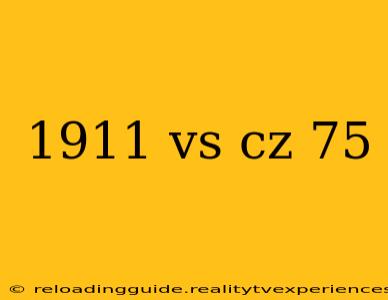The Colt 1911 and the CZ 75 are both legendary handguns, each boasting a loyal following and a rich history. Choosing between them often sparks passionate debates, as both offer distinct advantages and disadvantages. This in-depth comparison will explore the key differences, helping you decide which pistol best suits your needs and preferences.
Design and Ergonomics: A Tale of Two Philosophies
The 1911, a classic single-action design, is renowned for its sleek profile and simple, elegant mechanics. Its single-stack magazine holds fewer rounds compared to the CZ 75, but this contributes to its slimmer grip, often preferred for concealed carry. The grip angle is noticeably steeper, which some shooters find more natural for pointing. However, its grip can feel less substantial for those with larger hands.
The CZ 75, on the other hand, represents a double-action/single-action (DA/SA) design with a double-stack magazine. This translates to a higher capacity and a more substantial feel in the hand. Its lower grip angle suits a wider range of hand sizes, offering greater comfort and control during extended shooting sessions. The ergonomics of the CZ 75 are generally considered more adaptable to different shooters.
Key Differences Summarized:
| Feature | 1911 | CZ 75 |
|---|---|---|
| Action Type | Single-Action | Double-Action/Single-Action (DA/SA) |
| Magazine Capacity | Typically 7-8 rounds | Typically 14-17 rounds (depending on model) |
| Grip Angle | Steeper | Lower |
| Grip Size | Slimmer, may be less comfortable for larger hands | More substantial, generally more comfortable |
Accuracy and Reliability: Precision vs. Workhorse
Both the 1911 and the CZ 75 are known for their reliability, though their strengths vary. The 1911's single-action trigger, when properly tuned, is renowned for its crispness and short reset, contributing to exceptional accuracy for those experienced with single-action pistols. However, the design's simplicity does mean that proper maintenance is crucial for optimal performance.
The CZ 75's DA/SA trigger is initially heavier in double-action mode, providing a more cautious, controlled first shot. The single-action follow-up shots are generally smoother and lighter than the initial pull. This versatility makes it suitable for various shooting disciplines. CZ 75s are generally considered very reliable, even under less-than-ideal conditions.
Maintenance and Customization: A Matter of Simplicity vs. Adaptability
The 1911 is appreciated for its relatively simple design, which often makes maintenance straightforward for knowledgeable gun owners. However, finding parts can occasionally be more challenging.
The CZ 75, while more complex internally, has readily available parts and accessories. The wide aftermarket support allows for significant customization, catering to individual preferences and shooting styles.
Cost and Availability: A Balancing Act
The price point of both the 1911 and the CZ 75 varies widely depending on manufacturer, materials, and specific features. Generally, you can find both within a comparable price range, although high-end models of either can be significantly more expensive. Availability also varies geographically and depending on market trends.
Conclusion: The Right Pistol for You
Ultimately, the "better" pistol – the 1911 or the CZ 75 – depends entirely on individual needs and preferences. The 1911, with its elegant design and crisp single-action trigger, appeals to those prioritizing accuracy and a classic feel. The CZ 75, with its higher capacity, adaptable ergonomics, and reliable DA/SA action, suits a broader range of users and shooting styles. Consider your shooting experience, hand size, intended use (e.g., concealed carry, competition, home defense), and budget before making your decision. Renting or borrowing both pistols, if possible, is highly recommended to allow for a hands-on comparison.

